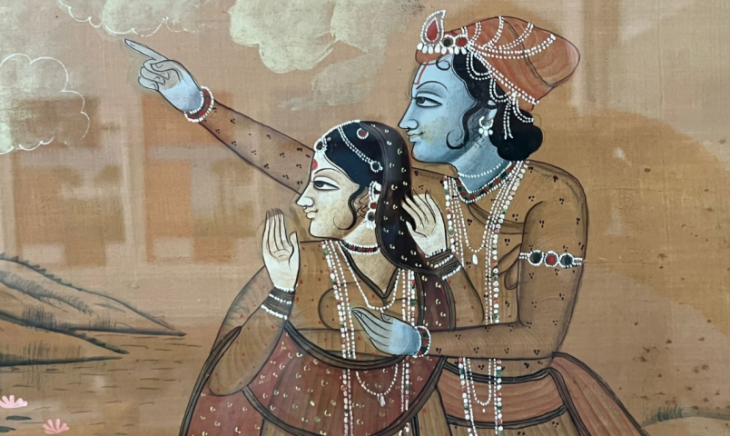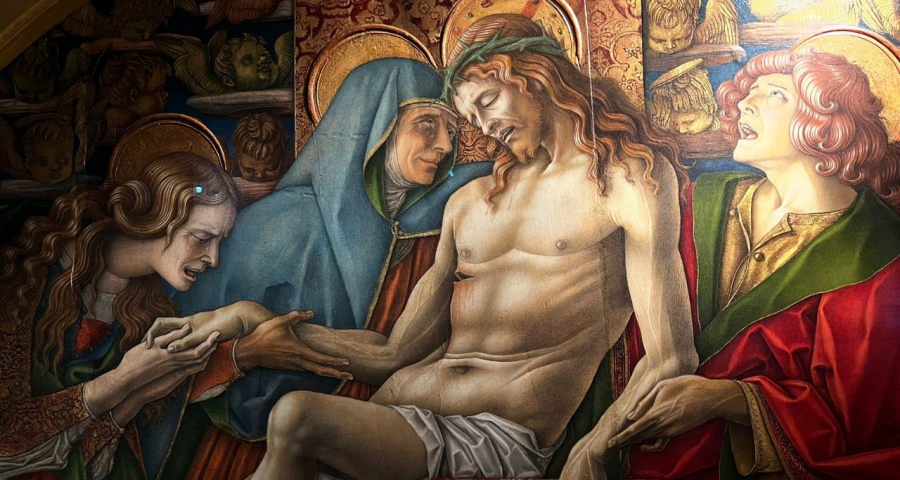The Star of Absence/9 - The righteous do not enjoy the suffering of others, not even of their "enemies"
By Luigino Bruni
Published in Avvenire 29/01/2023
"The contradiction between the New and Old Testaments is the contradiction between disappointment and promise; it is the failure of the promise to bless us in life and in joy. Hence, he who is able to keep his faith in the promise even while standing under the cross is blessed. Thus, if forced to throw the Old or the New Testament from a tower, I would end up throwing the New Testament from the tower, because I know that the New Testament is the epilogue of the Old, the necessary conclusion, its extreme consequence."
Correspondence Between Sergio Quinzio and Guido Ceronetti, An Attempt to Bridge the Abyss
King Xerxes’ strange insomnia triggers a series of coincidences that will lead to the reversal of the fate of Haman, an episode that becomes a precious lesson on gratitude and the difference between humility and humiliation.
The Book of Esther was one of the most read books by Jews during the Nazi and Fascist persecutions. Reading turned into prayer, the book turned into a cry: "Esther has returned, Mordecai has returned, stop the homicidal madness of the new Haman". A cry that must be renewed today in memory of that terrible time, and then flourish in prayer in all those places, which are still too many, where Haman continues to carry out his extermination plans. Etty Hillesum’s name, a young Dutch Jew, one of the greatest prophetic and poetic souls of the twentieth century, deported and killed in Auschwitz, was Esther.
«That night the king could not sleep; so he ordered the book of the chronicles, the record of his reign, to be brought in and read to him. It was found recorded there that Mordecai had exposed Bigthana and Teresh, two of the king’s officers who guarded the doorway, who had conspired to assassinate King Xerxes. “What honour and recognition has Mordecai received for this?” the king asked. “Nothing has been done for him,” his attendants answered» (The Book of Esther 6,1-3). In the day that passes between the first and second banquet prepared by Esther for Xerxes and Kana (Ch. 5), something unexpected happens. Insomnia enters the scene, and in order to be able to fall asleep the king asks that the register of the court chronicles be brought to him, a literary genre that we today (perhaps) would hardly choose to go back to sleep.
The Greek version of the text has a different incipit: «But the Lord removed sleep from the King that night». Here God is the hidden agent of the series of providential combinations of this decisive episode - a God who, we know, never appears in the Hebrew text. Explaining the king's insomnia using the invisible and provident hand of God appears as the simplest narrative and religious strategy. In reality it is the most difficult and dangerous one. Because if we say that to us the hand of God is behind random events and coincidences with happy outcomes, how do we explain the absence of that same hand all the times when the king proceeds to fall asleep and Haman proceeds to hang the many Mordecai who appear in history?
Of course, we can always think along the lines of Job's friends, that the invisible hand of God only follows the coincidences of the good in order to reward them, while the absence of that same hand signals the presence of some fault in others, thereby only reinforcing the ancient "retributive theology” that has caused so much damage. It is in fact too convenient, and therefore wrong, to include the role of God in the script only for stories with happy endings and to remove it when a decree becomes operational and exterminations are carried out. Thus, the choice of the Hebrew text, which does not let God enter into all these bizarre coincidences, is much better: it takes note of them, but remains silent. Better to remain ignorant of the unspoken reasons - when the Bible does not offer us an explanation of an event, the wisest choice is not to pretend to know God's will better than the Bible that is keeping us in wrapped mystery.
The king reads the minutes, re-discovers that Mordecai’s intervention saved him (Esther 2,21-23) and realizes that he has done nothing to thank or reward Mordecai. The theme is therefore reciprocity, recognition, gratitude (charis, in Greek, the same word that would be translated into Latin as gratia). Faced with his servants’ reply – «Nothing has been done for him» – the king feels the debt due to his lack of reciprocity. In that ancient world based entirely on the concepts of honour and shame, being considered ungrateful was a great evil indeed, for everyone but especially for sovereigns. A ruler was just and therefore loved by his people (all rulers want the love of their people, even bad ones) if he was capable of gratitude, if he knew how to identify the merits of his subjects and then reward them. Furthermore, in this case Mordecai's meritorious deed directly concerned the king, hence the ingratitude shown in this case was even more serious, and showing himself ungrateful would have undermined the reputation of the sovereign.
Hence, there may be a more instrumental and opportunistic reason for Xerxes' need for recognition. It behoves him to be grateful because the benefits of an act of gratitude (the esteem of the people) are much greater than its cost. For this reason, kings had to be grateful and therefore recognize the honour of certain actions if they wished to be loved and not just feared. In our society, the bouts of insomnia of kings (which continue to this day) produce other kids of actions; consensus is not linked to gratitude for the honour of their subjects but to the cold calculation of interests, where idolized merits only serve to generate an ungrateful civilization. Not even here, do we really know whether there was also a sincere aspect to Xerxes' need to repay his debt. Maybe there was, it does feel good to think that the same benevolence which we credited him with in his sincere gesture of tenderness towards Esther, who fainted from fear, was activated in this instance as well (Esther Additions 15,15 KJVA). Being cynical is never helpful in life, but it is especially harmful when reading a great literary work, and very harmful indeed when reading the Bible. It prevents us from tuning into the anti-cynicism of God, who every morning continues to look at the earth "hoping everything, believing everything and loving everything”, without getting discouraged by our humble horizontal and vertical reciprocity
Here's another coincidence, however: Haman also suffered from insomnia on the same special night while waiting: «So the king said, “Who is in the court?” Now Haman had just entered the outer court of the king’s palace to ask the king about [c]hanging Mordecai on the gallows which he had prepared for him» (Esther 6,4). That double bout of insomnia ends up complicating Haman's perverse project. Indeed, the king said: «“Let him come in.” So Haman came in and the king said to him, “What is to be done for the man whom the king desires to honour?”» (Esther 6,5-6). With a clearly humorous tone, Xerxes, who appears in good faith and has apparently forgotten the extermination decree signed by himself, asks Haman to suggest a suitable reward. Like all rewards in the ancient civilizations built on the concepts of shame and honour, they must be delivered in public, in the town square – because rewards, unlike incentives, only make sense when witnessed by the community.
We are close to a reversal of fortunes (purim), which makes use of a fatal, clumsy and naive mistake by Haman: «Now Haman thought to himself, “Whom would the king desire to honour more than me?” So Haman said to the king, “For the man whom the king desires to honour, let a royal robe be brought which the king has worn, and the horse on which the king has ridden… and let the robe and the horse be handed over to one of the king’s most noble officials. Let him dress the man whom the king delights to honour [in the royal robe] and lead him on horseback through the open square of the city, and proclaim before him, ‘This is what shall be done for the man whom the king desires to honour’”» (Esther 6,6-9). Thinking that he is the one about to be publicly honoured, Haman advises the king all the pomp and circumstance, a ceremony so solemn it verges on the ridiculous. However, here is the narrative turning point, which (unlike Haman) we already know: «Then the king said to Haman, “Quickly take the royal robe and the horse, as you have said, and do this for Mordecai… Leave out nothing of all that you have said.” So Haman took the royal robe and the horse and dressed Mordecai, and led him on horseback through the open square of the city, proclaiming before him, “This is what shall be done for the man whom the king desires to honour.” Then Mordecai returned to the king’s gate. But Haman hurried to his [own] house, mourning and with his head covered in sorrow» (Esther 6,10-12). The roles and fortunes had now been reversed: Haman ends up being forced to honour the person he hates.
The humiliations that others intentionally bring about are never a good thing. Because few actions are more harmful than those orchestrated to humiliate someone else, perhaps thinking that it will help them to become more humble. People who are humiliated by others should not be confused with humble people, even if on the surface they may look alike, they rarely coincide. Those who have been humiliated almost always lack joy, internal peace and are often filled with hatred and hatred for life, while the humble are joyful, meek and at peace with themselves and the world. A different case altogether happens when life itself humiliates us without anyone wanting it, as in the case of Haman. In these cases, sometimes, these unwanted humiliations can sometimes generate a good sort of humility; it can happen, but even so, we can never be certain of the outcome. Sometimes, even the humiliations brought unto us by life only make us worse, above all if we experience them with the conviction that we do not deserve them and therefore do not welcome them with the meekness that is the necessary virtue by which to transform a humiliation into true humility.
Furthermore, when humility is cultivated and preserved over the years (perhaps only the elderly are truly humble) and becomes a habitus, it can achieve the miracle of transforming even the bad humiliations inflicted upon us by others into something good. Mordecai's passivity is striking in this episode: he never sought recognition from the king or humiliation from Haman: these merely arrived on the trail of a mysterious justice where his great enemy ended up becoming the squire of his glory. The text does not feel the need to describe Mordecai's feelings of revenge to us, perhaps because those who are just do not enjoy the humiliations of others, not even those of their enemies. Hence, after his great reward Mordecai goes back to rearing his usual sack, that extraordinary glory had not consumed his humility.
A year before being deported to Auschwitz where she died, Edith Stein, a Jew, philosopher and Carmelite nun, wrote a poetic composition with a prophetic title: Nocturnal dialogue. Edith imagines that a mysterious female figure enters the monastery and begins a dialogue with the mother prioress at night: the woman who arrives is Esther: « Thus the day came when I approached the King to beg for salvation. Life or death depended on his gaze. With a friendly look, he welcomed me…». Then the prioress asks Esther a question: «And today a new Haman with bitter hatred has sworn extermination: is this why Esther has returned? Esther replies: “Yes, as you say. Yes, I wander through the world to beg refuge for the people without a home, always driven out and downtrodden, yet who can never die"». It is now up to us to continue her interrupted dialogue with Esther, in the certain expectation of dawn.













